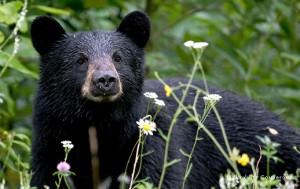We have much more to do and your continued support is needed now more than ever.
Climate Change Brings Black Bears Close to Home
There is nothing like the thrill of seeing a black bear in the wild. I will never forget when I saw my first family of black bears in the Hickory Run State Park in eastern Pennsylvania. But when you see black bears in your suburban backyard, that sense of thrill and excitement is easily replaced with fear.
In the past week, the Philly suburbs where I grew up have seen three separate instances of a black bears wandering in backyards and around residential areas. The first bear was captured safety in Abington, PA last week after wandering around crowded Northeast Philadelphia. The second bear, found in neighboring Bensalem, PA, and sadly was injured and had to be euthanized. A third bear was spotted yesterday in Chalfont, PA, causing nearby schools to keep kids inside for recess.
Black bear spotted in Abington Twp enjoying an evening snack. PA Game Commission hoping to find him better home! pic.twitter.com/MLOpCvVXfG
— Kelley Warner (@APDKelleyWarner) May 15, 2014
It is likely that climate change is playing a role in this spike of black bear sightings. In the report, Mascot Madness: How Climate Change is Hurting School Spirit, the effect of global warming on black bears is discussed:
Although black bears have a diverse diet and range widely across North America, they are not immune to climate change. Drought, one of the many consequences of climate change, has already left bears desperately hungry. This is putting both humans and bears at risk, as bears have begun to venture into towns and communities.

Next week we will see a huge move forward on climate as President Obama and the Environmental Protection Agency roll out the much anticipated carbon rules. The carbon rules will be the biggest action that America has taken to address our most carbon polluting source: power plants. Currently, there are no limits to how much a power plant can pollute. Every year, U.S. power plants spew over 2 billion metric tons of carbon dioxide into the atmosphere. These new regulations will be the first step forward to protecting both humans and wildlife, like the black bear, from the challenges of climate change.
![]() Take action now! Support action to limit carbon pollution and help wildlife like the black bear.
Take action now! Support action to limit carbon pollution and help wildlife like the black bear.





















